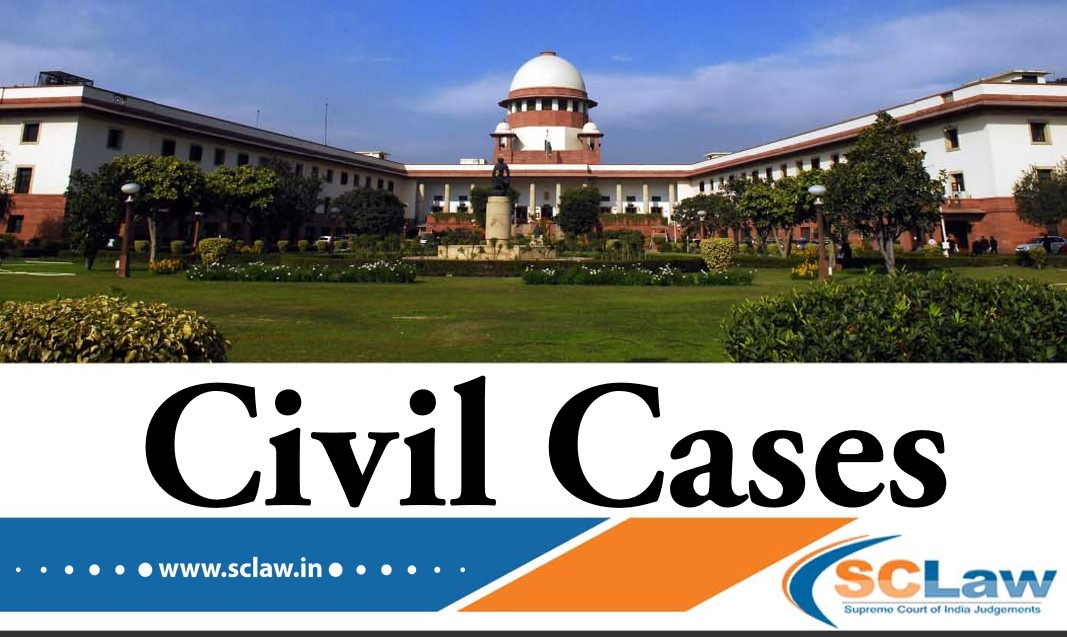Public officers should not be called to court unnecessarily – Judges must know their limits. They must have modesty and humility, and not behave like emperors
SUPREME COURT OF INDIA DIVISION BENCH THE STATE OF UTTAR PRADESH AND OTHERS — Appellant Vs. DR. MANOJ KUMAR SHARMA — Respondent ( Before : Sanjay Kishan Kaul and Hemant…
Service Law – Higher Pay Scale – Grant of benefits of higher pay scale to the Central/State Government employees stand on different footing than grant of pay scale by an instrumentality of the State – Employees of Punjab State Co-operative Milk Producers Federation are entitled to pay scale equivalent to their counterparts in State of Punjab
SUPREME COURT OF INDIA DIVISION BENCH PUNJAB STATE CO-OPERATIVE MILK PRODUCERS FEDERATION LIMITED AND ANOTHER — Appellant Vs. BALBIR KUMAR WALIA AND OTHERS — Respondent ( Before : Sanjay Kishan…
(CrPC) – Section 250(1) – Compensation for accusation without reasonable cause – Condition for payment of compensation to victims cannot be imposed at the stage of bail.
SUPREME COURT OF INDIA DIVISION BENCH DHARMESH @ DHARMENDRA @ DHAMO JAGDISHBHAI @ JAGABHAI BHAGUBHAI RATADIA AND ANOTHER — Appellant Vs. THE STATE OF GUJARAT — Respondent ( Before :…
HELD – Section 17(2)(vi) of the Registration Act, 1908. – Principle is based on the fact that family settlement only declares the rights which are already possessed by the parties – A compromise decree in respect of land which is not the subject-matter of suit but is part of the settlement between the family members does not requires compulsory registration in terms of
SUPREME COURT OF INDIA DIVISION BENCH RIPUDAMAN SINGH — Appellant Vs. TIKKA MAHESHWAR CHAND — Respondent ( Before : Sanjay Kishan Kaul and Hemant Gupta, JJ. ) Civil Appeal No.…
Representatives of Facebook has to appear before the Delhi Assembly panel – Any representative of Facebook who would appear before the Committee would be well within their right to refuse to answer the query and such an approach cannot be taken amiss with possibility of inviting privilege proceedingsHELD The power to compel attendance by initiating privilege proceedings is an essential power
SUPREME COURT OF INDIA FULL BENCH AJIT MOHAN AND OTHERS — Appellant Vs. LEGISLATIVE ASSEMBLY NATIONAL CAPITAL TERRITORY OF DELHI AND OTHERS — Respondent ( Before : Sanjay Kishan Kaul,…
Dacoity with murder – Life Imprisonment without Remission – Trial court was not competent to direct that no remission would be awarded before 20 years, while imposing life imprisonment – Appeal allowed.
SUPREME COURT OF INDIA DIVISION BENCH MANOHAR @ MANU — Appellant Vs. THE STATE OF KARNATAKA — Respondent ( Before : Navin Sinha and R. Subhash Reddy, JJ. ) Criminal…
In view of the Notification dated 19th March 2021 – Writ petitions are allowed. HELD Pharmacy Council of India (PCI) has granted approval to both colleges with an intake capacity of 60 students each – State Government vide Notification dated 19.3.2021 has granted conditional affiliation after considering the recommendations made by the Affiliation Committee
SUPREME COURT OF INDIA FULL BENCH SRI SAI RR INSTITUTE OF PHARMACY — Appellant Vs. DR. A.P.J. ABDUL KALAM TECHNICAL UNIVERSITY AND ANOTHER — Respondent ( Before : R.F. Nariman,…
SCOI deprecated the practice of summoning public officials to court, stating that “a practice has developed in certain High Courts to call officers at the drop of a hat and to exert direct or indirect pressure.”
SCOI deprecated the practice of summoning public officials to court, stating that “a practice has developed in certain High Courts to call officers at the drop of a hat…
Penal Code, 1860 (IPC) – Sections 302 r/w 34 – Murder – Non-recovery of the weapon – For convicting an accused, recovery of the weapon used in commission of offence is not a sine qua non.
SUPREME COURT OF INDIA DIVISION BENCH RAKESH AND ANOTHER — Appellant Vs. STATE OF U.P. AND ANOTHER — Respondent ( Before : Dr. Dhananjaya Y. Chandrachud and M.R. Shah, JJ.…
(CPC) – Order 23 Rule 3A – Bar to suit – A party to a consent decree based on a compromise to challenge the compromise decree on the ground that the decree was not lawful, i.e., it was void or voidable has to approach the same court, which recorded the compromise and a separate suit challenging the consent decree has been held to be not maintainable.
SUPREME COURT OF INDIA DIVISION BENCH R. JANAKIAMMAL AND S.R. SOMASUNDARAM AND ANOTHER — Appellant Vs. S.K. KUMARASAMY(DECEASED) THROUGH LEGAL REPRESENTATIVES AND OTHERS — Respondent ( Before : Ashok Bhushan…











